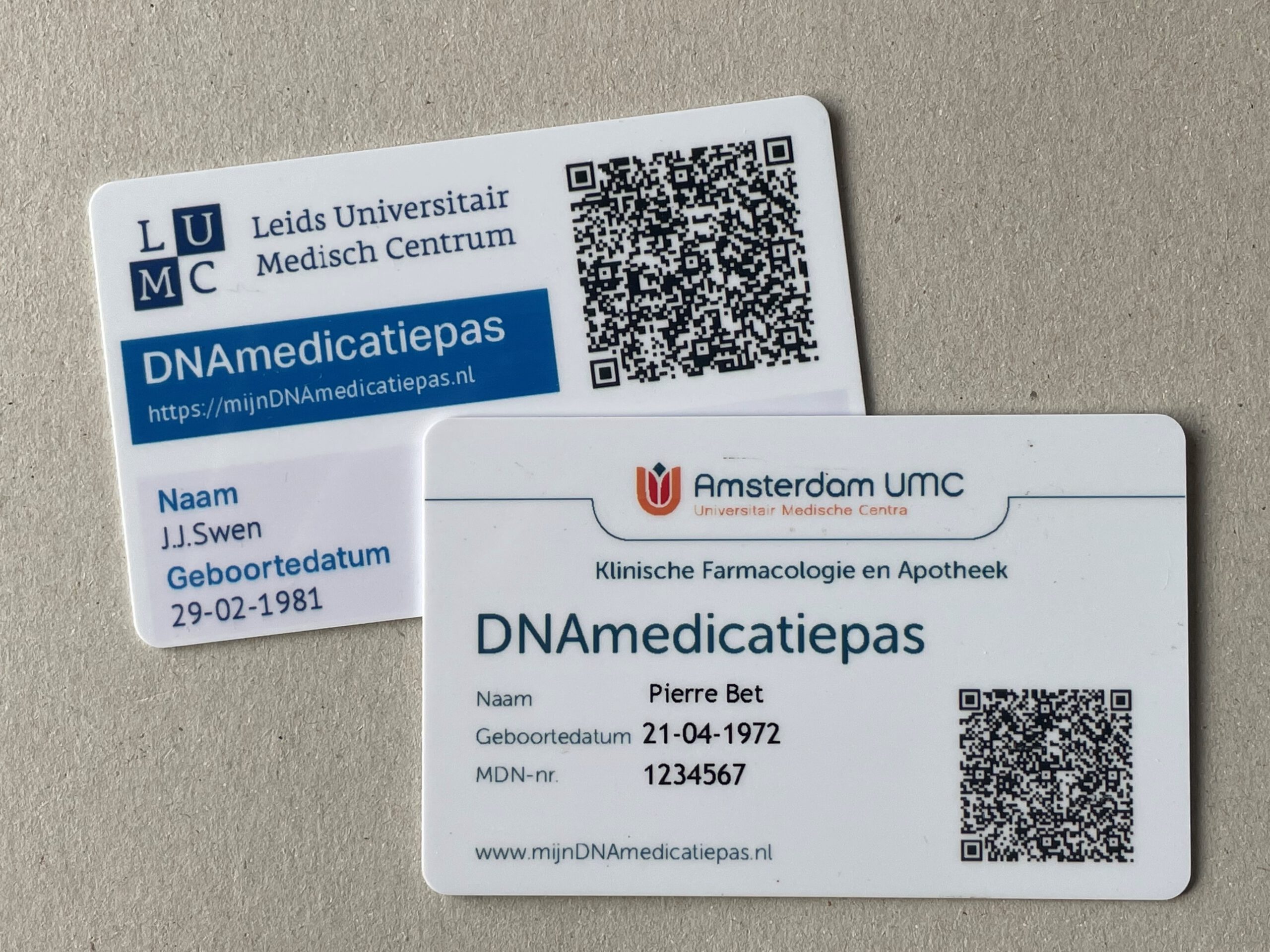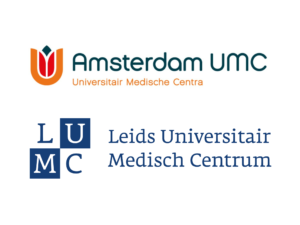The DNA profile of a patient influences how drugs affect the body. Knowledge of the DNA profile improves the ability of physicians and pharmacists to fine-tune medication to the specific patient. Available genetic information from extensive DNA analysis was barely being applied in the everyday healthcare process for individualised pharmacogenetic advice, but this valuable information is now available via the DNAmedicatiepas. The pass is an easy way for patients, physicians and pharmacists to verify whether the genetic profile of the individual patient is being taken into account. An example of the way in which genetic variation can influence the effect of medication is that a genetic variant may render a patient poorly equipped to produce a certain enzyme, which harms their ability to break down a drug and increases their exposure to side effects. The pass is intended to reduce side effects and speed up the process of finding the right drug and dosage. This benefits the patient and has the potential to reduce healthcare consumption.

The DNAmedicatiepas connects personal genetic information, based on whole exome sequencing (WES), with current Dutch medication recommendations. The personal pass has a QR code that contains the relevant genetic variants of the patient. The patient shows the pharmacist or physician their pass. They scan the pass to see whether the prescription needs to be adjusted based on the genetic profile. As a result, the information travels along with the patient throughout the healthcare chain. The patient retains control of where this information ends up. A unique innovation that makes genetic information accessible in a practical way, both to the patient and the healthcare professional.
Development & implementation
The hospital pharmacies and genetics departments of Amsterdam UMC and Leiden University Medical Centre (LUMC) have partnered up to develop the new, modern DNAmedicatiepas. “In the Netherlands, we have been exploring the possibilities of individualising drug therapy based on the genetic information of a patient for over 15 years. Recommendations by the national pharmacogenetics work group have been available for some time now, but until recently very few patients had mapped their genetic profile. Thanks to the rise of WES within clinical genetics, this number grew and LUMC began investigating the possibility of retrieving pharmacogenetic information from patients’ WES data in 2016”, according to Jesse Swen, hospital pharmacist at LUMC. In 2017, Amsterdam UMC assigned an innovation budget to investigate the possibilities for this development. Pierre Bet, hospital pharmacist at Amsterdam UMC: “This innovation budget finally allowed us to start working on a long-standing ambition. Our relationship with LUMC had been forged some time before and entering into a partnership with LUMC for this project was a sensible step.”
In 2018, a multidisciplinary work group was formed to elaborate the initial ideas, including clinical geneticists, bio-informaticians, hospital pharmacists, researchers and a pharmacist from Z-Index B.V. “We basically started with a group of believers from multiple disciplines with an intrinsic motivation and a clear desire to make genetic information available to patients and link it to pharmacogenetic recommendations. In the same period, a large-scale European study was being led by LUMC to help establish an infrastructure for transferring genetic information to patients11”, says Swen. Bet: “The right people were on board from the start and a lot of support for the project emerged within the organisations. In addition, we involved or informed all relevant stakeholders on a regular basis, such as department heads, professional organisations and umbrella associations.“ The project transcended multiple disciplines and departments, which added to the complexity and demanded a lot of clarification and patience from the work group. Bet: “We found ourselves speaking a different language at times”. In addition, the application does not pertain to a specific patient population, which made it difficult to involve patients and healthcare professionals. Swen: “It can benefit heart patients but only touches a minor fraction of the cardiology profession. The same applies to other occupational groups.” Despite the challenges and limited resources, gradual progress was made. With the help of students, among others. And surveys conducted among the target group revealed that patients had a need for such a pass. Following a brief written explanation, 96% of respondents wanted to receive their DNAmedicatiepas. Bet: “Now that we actually have a tangible product, interest has only increased!”.
The first 1,000 passes were distributed in the first quarter of 2021 among patients of Amsterdam UMC and LUMC. They had already undergone extensive DNA analyses (WES) at the clinical/human genetics department. Patients are enthusiastic and the pass is being used regularly. The medical recommendations are based on a national database (the G Standard issued by Z-index BV) with 141 gen-medication recommendations at the time of writing. And the database is expanding continuously. “As such, we are utilising the current Dutch pharmacogenetic recommendations and KNMP guidelines. These are the same recommendations that can be generated via an electronic prescription system or a pharmacy information system, as long as the results of the DNA analyses are correctly entered into the patient file”, Swen explains. The individual DNA data are only stored in the QR code on the DNAmedicatiepas and are submitted to the database without any personal data. The DNA data are not stored centrally and the pharmacogenetic recommendations are generated from scratch with each scan based on the most current guidelines.
The future
The European study led by LUMC11 is investigating whether a pharmacogenetic profile actually reduces side effects and improves effectiveness. In addition, several subsidy requests and plans for the continued development of the pas have been submitted. The DNAmedicatiepas is currently available to a limited group of people but will be deployed at a much larger scale in the future. Especially once the costs associated with WES drop and the effectiveness of pharmacogenetics is definitively proven. The costs of the DNAmedicatiepas will remain limited as the DNA analysis has already been performed (and paid for). The next step is for other hospitals that use WES data to join in on the mijn DNAmedicatiepas. In order to create a uniform working method in the Netherlands and allow patients to use their medicatiepas everywhere. Without confronting healthcare professionals in the chain with inconsistent results. Bet: “The potential is gigantic, not just for WES data. Around 15,000-20,000 WES analyses are currently being performed in the Netherlands every year. That number is set to increase in the years ahead, in part because WES is now covered by insurance for patients with an unknown primary tumour.” “And we deliberately developed the pass as open-source software. Despite each hospital having its own systems, they will all be able to use the pass. The technology is shared but every hospital can design the pass to fit its own corporate identity. And we maintain the ability to connect information from other and new analyses to the pass, such as results from Global Sreening Arrays”, Swen adds. As such, personalised medicine will play an increasingly significant role in the healthcare system.
- Horizon 2020. Ubiquitous Pharmacogenomics (U-PGx): Making actionable pharmacogenomic data and effective treatment optimization accessible to every European citizen. 2016-2021.

